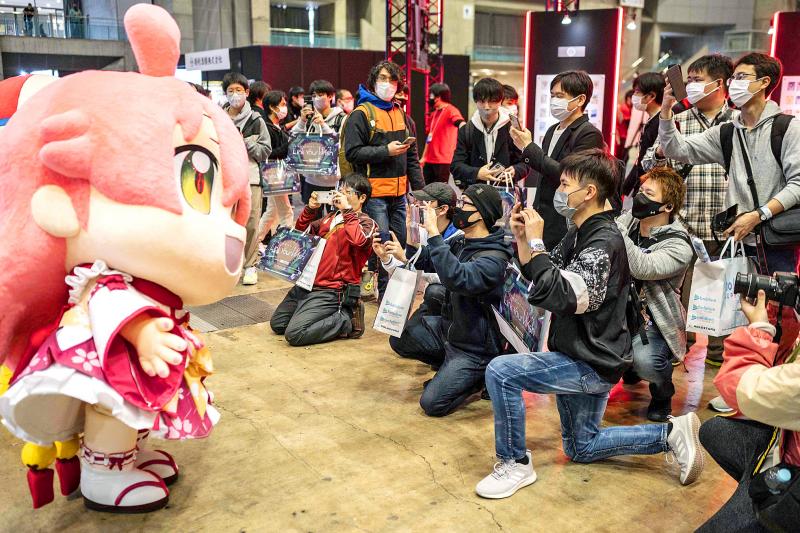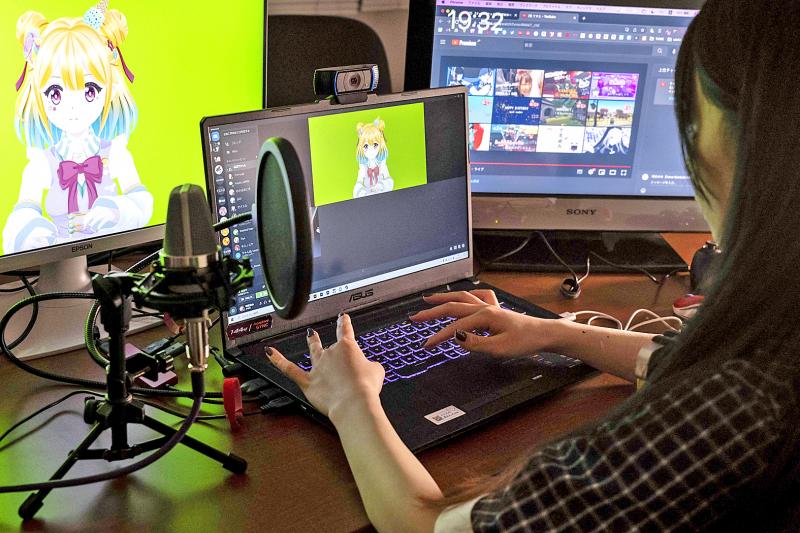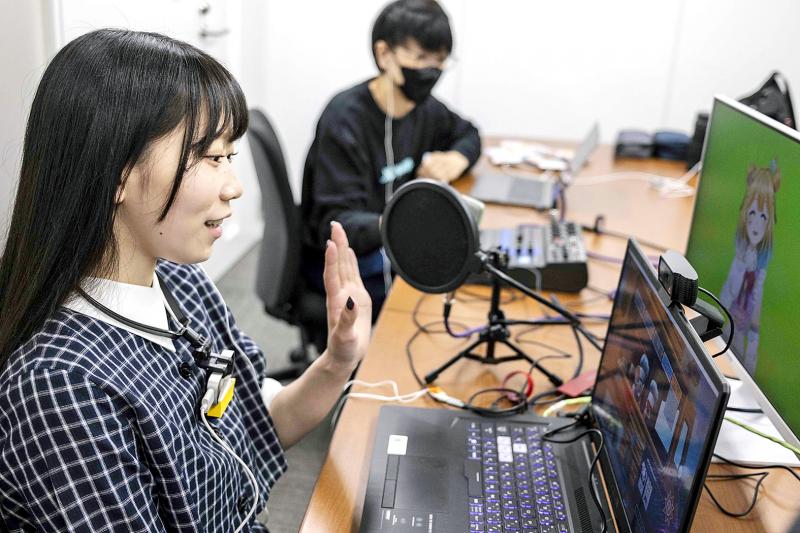Mayu Iizuka sheds her soft-spoken personality and starts cackling, screaming and waving wildly in a makeshift studio in Tokyo as her avatar appears on a livestream before hundreds of fans.
Virtual YouTubers such as Iizuka, who voices and animates a character called Yume Kotobuki, have transformed a niche Japanese subculture into a thriving industry where top accounts can rake in more than US$1 million a year.
The videos are designed to make fans feel they are interacting directly with their favorite animated idols — with viewers sometimes paying hundreds of US dollars to have a single comment highlighted on a livestream.

Photo: AFP
“When I’m playing video games on my channel and succeed at something, my fans congratulate me” and pay tips “as a way to show their support and appreciation,” Iizuka said.
The 26-year-old uses a laptop, Webcam and a motion sensor worn around her neck to appear on screen as Yume, whose facial expressions are controlled by a producer.
With her squeaky voice, short skirt and huge purple eyes, Iizuka’s avatar follows a popular model for “VTuber” characters, which often resemble the hyper-feminine heroines of Japanese anime.

Photo: AFP
Since emerging about five years ago, the VTuber world has grown quickly, with about 16,000 active streamers globally, data firm User Local said.
Fanbases are also growing on other platforms such as TikTok and gaming site Twitch.
Regional governments in Japan have used them for promotion, and The Batman stars Robert Pattinson and Zoe Kravitz even gave a recent interview to a top Japanese VTuber.

Photo: AFP
VTubers generate money in ways similar to traditional livestreamers, including through YouTube’s “Super Chat” system, where the more a fan shells out, the more attention is drawn to their comments.
The world’s nine top-earning YouTube accounts for “Super Chat” last year were all VTubers.
All nine are affiliated with one Tokyo-based talent agency, and each earned between US$700,000 and US$1.7 million from the cash gifts, data analysis Web site Playboard said.
Most fans spend only a few hundred yen per comment, but the most dedicated sometimes splurge ¥50,000 (US$383) to post impassioned missives to their virtual idols.
Kazuma Murakami, a 30-year-old auto parts inspector, has been known to spend ¥10,000 to get his comments highlighted in red and seen by his favorite VTuber.
“I really want her to notice I’m here again, visiting her channel,” Murakami said.
Another VTuber fan, who asked to be identified only by his first name, Kazumi, has adorned his tiny one-room apartment near Tokyo with posters, framed pictures and key rings featuring his favorite character, Mio Ookami.
The 30-year-old computer engineer spends time after work and on weekends immersing himself in Mio’s videos and crafting digital illustrations of the black-haired “wolf girl.”
“I dedicate five, or maybe 10 hours to thinking just about her,” he said. “She is like family to me.”
That devotion, and the willingness of fans to pay big money, is linked to the way other fan subcultures function in Japan, said Noriyuki Nagamatsu, a digital business specialist at advertising firm D.A. Consortium.
“Super Chat is essentially an extension of a longstanding culture where idol and anime fans try to support their oshi, or favorite, by splurging on their merchandise,” he said. “It’s also a way of winning attention from their beloved and feeling superior to fellow fans.”
VTubers usually keep the person behind the character — often referred to as their “soul” — out of the picture, and like many fans, Kazumi said his love is directed towards Mio the avatar, not whoever plays her.
However, the line between virtual and real can become blurred.
A Japanese court recently ruled in favor of a VTuber actor who said that online slander against her character amounted to an attack on her.
Virtual YouTubers can “transcend gender, age or physique ... but what’s important is that there’s a real person there who is speaking and reads the comments in real life,” said Kazuhito Ozawa, the plaintiff’s lawyer.
For Iizuka, a professional voice actress, making the rare decision to reveal her identity after four years of making videos as Yume was nerve-wracking.
“Part of me was afraid that fans of Yume, who has these big, shiny eyes and a perfect belly, might be disappointed to find out what the ‘real’ person inside looks like,” she said, adding that “so far the response from fans has been very kind.”
The more outspoken, vivacious personality of Yume’s virtual self is even gradually rubbing off on Iizuka, she said.
“I used to baulk at speaking publicly, but Yume is such an experienced livestreamer that my identity as her has been helping me speak more confidently,” she said.

Shares in Taiwan closed at a new high yesterday, the first trading day of the new year, as contract chipmaker Taiwan Semiconductor Manufacturing Co (TSMC, 台積電) continued to break records amid an artificial intelligence (AI) boom, dealers said. The TAIEX closed up 386.21 points, or 1.33 percent, at 29,349.81, with turnover totaling NT$648.844 billion (US$20.65 billion). “Judging from a stronger Taiwan dollar against the US dollar, I think foreign institutional investors returned from the holidays and brought funds into the local market,” Concord Securities Co (康和證券) analyst Kerry Huang (黃志祺) said. “Foreign investors just rebuilt their positions with TSMC as their top target,

REVENUE PERFORMANCE: Cloud and network products, and electronic components saw strong increases, while smart consumer electronics and computing products fell Hon Hai Precision Industry Co (鴻海精密) yesterday posted 26.51 percent quarterly growth in revenue for last quarter to NT$2.6 trillion (US$82.44 billion), the strongest on record for the period and above expectations, but the company forecast a slight revenue dip this quarter due to seasonal factors. On an annual basis, revenue last quarter grew 22.07 percent, the company said. Analysts on average estimated about NT$2.4 trillion increase. Hon Hai, which assembles servers for Nvidia Corp and iPhones for Apple Inc, is expanding its capacity in the US, adding artificial intelligence (AI) server production in Wisconsin and Texas, where it operates established campuses. This

US President Donald Trump on Friday blocked US photonics firm HieFo Corp’s US$3 million acquisition of assets in New Jersey-based aerospace and defense specialist Emcore Corp, citing national security and China-related concerns. In an order released by the White House, Trump said HieFo was “controlled by a citizen of the People’s Republic of China” and that its 2024 acquisition of Emcore’s businesses led the US president to believe that it might “take action that threatens to impair the national security of the United States.” The order did not name the person or detail Trump’s concerns. “The Transaction is hereby prohibited,”

Garment maker Makalot Industrial Co (聚陽) yesterday reported lower-than-expected fourth-quarter revenue of NT$7.93 billion (US$251.44 million), down 9.48 percent from NT$8.76 billion a year earlier. On a quarterly basis, revenue fell 10.83 percent from NT$8.89 billion, company data showed. The figure was also lower than market expectations of NT$8.05 billion, according to data compiled by Yuanta Securities Investment and Consulting Co (元大投顧), which had projected NT$8.22 billion. Makalot’s revenue this quarter would likely increase by a mid-teens percentage as the industry is entering its high season, Yuanta said. Overall, Makalot’s revenue last year totaled NT$34.43 billion, down 3.08 percent from its record NT$35.52